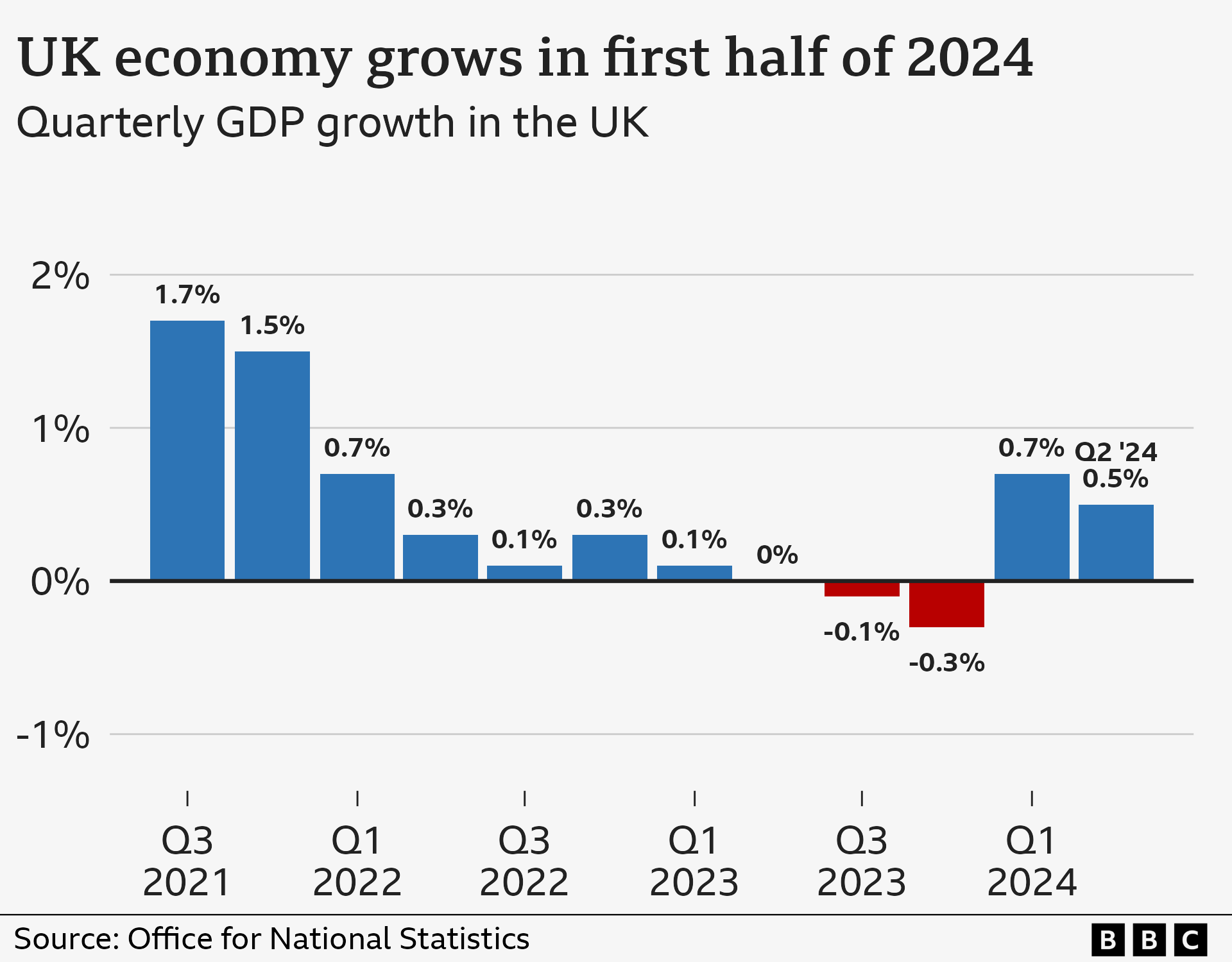Growth in the UK's economy has slowed in recent months, despite a pick-up in August, according to the Office for National Statistics (ONS).
The strength of the economy affects things like pay increases for workers and the amount of tax the government can raise to pay for services.
The Chancellor Rachel Reeves has warned she will have to make "difficult" decisions in the Budget on 30 October.
What is GDP and how is it worked out?
GDP is a measure of all the economic activity of companies, governments and people in a country.
In the UK, new GDP figures are published every month. However, quarterly figures - covering three months at a time - are considered more important.
Most economists, politicians and businesses like to see GDP rising steadily.
That's because it usually means people are spending more, extra jobs are created, more tax is paid and workers get better pay rises.
When GDP is falling, it means the economy is shrinking - which can be bad news for businesses and workers.
If GDP falls for two quarters in a row, that is known as a recession, which can lead to pay freezes and job losses.
What is happening to the UK economy?
The UK fell into recession at the end of 2023, when the economy shrank in the last two quarters of the year.
However, it rebounded strongly in the first three months of the year, when GDP increased by 0.7%, and this was followed by 0.5% growth between April and June.
The latest monthly figures from ONS showed that GDP rose by 0.2% in August, following zero growth in both June and July.
However, ahead of the Budget, the International Monetary Fund (IMF) raised its growth forecast for the UK.
The influential global organisation now expects the UK to grow by 1.1% in 2024, up from the 0.7% it forecast three months ago.
While slow compared to previous periods, this would put the UK in the middle of the pack of the world's leading nations.
The IMF and UK government have disagreed over previous predictions, and economic forecasts are not always accurate.
How does GDP affect me?
If GDP is going up steadily, people pay more in tax because they're earning and spending more.
This means more money for the government, which it can choose to spend on public services, such as schools, police and hospitals.
When the economy shrinks and a country goes into recession, these things can go into reverse.
Governments tend to get less money in tax, which means they may decide to freeze or cut public spending. Or taxes may rise.
In 2020, the Covid pandemic caused the most severe UK recession for more than 300 years, which forced the government to borrow hundreds of billions of pounds to support the economy.
How is GDP measured?
GDP can be measured in three ways:
Output: The total value of the goods and services produced by all sectors of the economy - agriculture, manufacturing, energy, construction, the service sector and government
Expenditure: The value of goods and services bought by households and by government, investment in machinery and buildings - this also includes the value of exports, minus imports
Income: The value of the income generated, mostly in terms of profits and wages
In the UK, the ONS publishes one single measure of GDP, which is calculated using all three measurements.
But early estimates mainly use the output measure, using data collected from thousands of companies.
Why does the GDP figure often change?
The UK produces one of the quickest estimates of GDP of the major economies, about 40 days after the quarter in question.
At that stage, only about 60% of the data is available, so the figure is revised as more information comes in.
The ONS publishes more information about this on its website.
What are the limitations of the GDP figure?
Hidden economy: Unpaid work such as caring for children or elderly relatives isn't captured
Inequality: GDP growth also doesn't show how income is split across a population - rising GDP could result from the richest getting richer, rather than everyone becoming better off
What is GDP per capita?
Just because GDP is increasing, it doesn't mean that an individual person's standard of living is improving.
If a country's population increases, it pushes GDP up, because with more people, more money will be spent.
But individuals within that country might not be getting richer. They may be getting poorer on average, even while GDP goes up.
The ONS also publishes a figure for GDP per capita - or head of population - which can tell a different story.
In fact, when you strip out inflation and population growth, the latest quarterly figures show that in the second three months of 2024, GDP per capita was 0.3% lower than for the same period in 2023.
Official GDP figures don't take into account unpaid work like looking after children
Some critics also argue that GDP doesn't take into account whether the economic growth it measures is sustainable, or the environmental damage it might do.
Alternative measures have been developed which try to capture this.
Since 2010, the ONS has also measured well-being alongside economic growth. This assesses health, relationships, education and skills, as well as people's personal finances and the environment.
But despite its limitations, GDP is still the most widely-used measure for most government decisions and international comparisons.





Post a Comment